He's churned up torrents of insults, incited grass-roots Republican fury, fearlessly flouted taboos on gender, race and religion and confounded the pundits again and again.
In a riotous six-month carnival of political incorrectness, Donald Trump has fused his message to the mood of his seething supporters like no other candidate and defied the conventions of a political game under whose rules he should have faded long ago.
Few in Republican Party politics believed when Trump launched his improbable White House bid in June that he'd still be a factor -- much less the factor -- at the end of the year.
Yet the billionaire has topped national polls since he entered the race, and in the latest CNN/ORC poll last week he was at 39%, double his nearest challenger. He's also well positioned in early voting states, meaning a headache-filled start to the year for GOP elites who fear his co-opting of their party could doom it to defeat next November.
As his campaign girds for new tests in the new year, it's a good time to assess how far Trump's political movement has come, what it has taught us about the state of American politics as 2016 dawns, and what we have learned about the man himself.
Trump, savvy politician
Ask those at a Trump rally why the billionaire businessman is their hero and you will hear a common refrain: He's not like the normal Washington crowd because he says things most people are afraid to.
Trump frequently insists he is not a politician at all and his image as a novice outsider unbeholden to GOP elites is crucial to his appeal.
But for all his inexperience and risk-taking, Trump was the most accomplished politician in the Republican field for much of 2015.
"He is a unique political animal who knows his audience and uses controversy as a political weapon better than anyone we have almost ever seen," said Republican political strategist Ford O'Connell.
Trump has already proved that he possesses one of the most valuable political attributes: the ability to sense something stirring in the electorate before anyone else.
His hard-line position on immigration -- one contrary to the desire of GOP leaders who want to reach out to Hispanic voters -- hit a sweet spot among the GOP's rank and file.
And late in the second term of Democrat Barack Obama's presidency, rooted in nuance, cultural sensitivity and professorial rhetoric -- conservatives would say obsessive political correctness -- many Republicans have been hungering for someone from outside the political mainstream to tell it like it is. They also view Obama as the most partisan and polarizing president of their lifetime, even as Obama complains that Republicans have tried to thwart him at every turn and make compromise impossible.
Trump shrewdly recognized that a party primed for rebellion -- that seems to hate its own leaders even more than it despises Obama -- would warmly welcome a rabble-rouser like himself.
And every time it looks like he's fading or one of his rivals is getting good press, he simply ignites a new outrage that steals attention from them and buys another couple of days of free media, be it by a call to ban Muslims from U.S. soil after terror attacks or feuding with Fox News star Megyn Kelly after a debate in which he received middling reviews.
Again and again, Trump has managed to make it impossible for conservatives to get to his right by adopting an extreme approach on some of the party's most emotive issues. He's promised to build a wall along the border and make Mexico pay for it. While other candidates fanned fears that Syrian refugee admittances could prove to be a Trojan horse for extremist groups, only Trump vowed to stop Muslims coming into the country.
Trump's rivals must also beware the sting of his tongue. Candidates who crossed him, like former Texas Gov. Rick Perry, Wisconsin Gov. Scott Walker and South Carolina Sen. Lindsey Graham, are out of the race. Trump's barb that former Florida Gov. Jeb Bush is a "low-energy" candidate has haunted the one-time $100 million Republican front-runner.
The blunt real estate mogul picks fights and attacks his opponents with zest, which attracts some voters and makes him no fun to run against.
And he's defused one big liability that helped doom Republican nominee Mitt Romney in 2012: He's made his wealth an asset, arguing that it frees him from the big-money insiders who control the political system.
So while he is a novice politician, Trump is by no means a novice at politics.
Entertainment is king
Every campaign needs a dash of showmanship. But with Trump, the showmanship is the center of the entire campaign.
Instead of dry policy pledges and reams of proposals, Trump vows to leave U.S. foes cowering, boasts about how rich he is, offers kids a ride in his helicopter and promises to "Make America Great Again." It's all part of the show.
Ever since John F. Kennedy stepped into a studio with a dark-jowled Richard Nixon for a presidential debate in 1960, politics and television have been inexorably converging.
Presidents now stop by late-night chat shows, seek new audiences online and try to bypass the traditional media altogether.
Politics, of course, has always been a performance art. Admired presidents like George Washington, Abraham Lincoln, Franklin Roosevelt and Ronald Reagan all understood the importance of theatrics to their job.
But Trump, the former "Apprentice" star, has taken that to another level: He has obliterated the line between politics and entertainment.
After six months of Trump's vulgarities, the day when President Bill Clinton was said to have demeaned his office by answering a question on MTV about whether he wore boxers or briefs seems quaint by comparison.
In effect, Trump has turned the presidential campaign into an episode of the audacious reality show that doubles for his life in the public eye.
And he's worked out the quickest possible way into the bloodstream of his angry political base, venting to more than 5 million followers on Twitter.
But he's not just a master of social media. Trump also plays the traditional media establishment like no one else. In an age when politicians hide behind layers of "communications" aides, Trump gives the impression he's always accessible.
He rarely deigns to show up in a studio like a normal candidate, preferring instead to call into cable shows or to summon interviewers to the lobby of Trump Tower in Manhattan for an audience in front of a glistening gold escalator. But he makes himself available for lengthy, seemingly off-the-cuff interviews at times nearly daily.
His critics might bash him as a misogynist and bigot, but it's undeniable that Trump's political show has left his Republican rivals gasping for broadcast air.
Every time he seems to have gone too far -- whether by attacking Mexicans or decrying Hillary Clinton's debate bathroom break as "disgusting" -- he skips away without a scratch.
In fact, his familiar persona as a bloviating celebrity seems to shield him from the censure that would have doomed a normal politician -- for instance, when he raised questions about Sen. John McCain's heroism as a Vietnam prisoner of war, mocked a disabled journalist and made unflattering comments about Republican rival Carly Fiorina's face.
It's a routine that has not gone down well with some GOP operators.
"The guy is obviously playing this crowd dynamic that the more bombastic and the more lunatic he sounds, the more they enjoy it," Republican consultant and Trump critic Rick Wilson told CNN's Don Lemon.
"He is a man-child disguised as a candidate. This is a guy who is making a Borscht-Belt-insult comic routine disguised as a presidential candidate," Wilson said.
How befuddled is the GOP establishment over Trump's threat?
The look of frustrated bewilderment on Bush's face at the last Republican debate said it all, as the son and brother of presidents implored voters to get it into their heads that a "serious" candidate is needed for serious times.
Once Trump was seen as a sideshow. Six months into his campaign, it's now everyone else in the GOP field who is the supporting act.
The establishment no longer rules
Should he grab the GOP nomination, Trump would overturn everything that we think we know from historical precedent and the lore of campaign politics, which dictates outsider candidates fade and establishment favorites ultimately rise to the top.
When he set off for the White House, Trump was treated as a joke in Washington. The punch line was seen as his own stream of consciousness masquerading as an announcement speech, in which he excoriated Mexicans as "rapists," questioned the intellect of Bush, branded U.S. leaders stupid and declared "the American dream is dead."
"There is no way to describe what happened," said CNN political analyst S.E. Cupp on television immediately after the speech. GOP elites, meanwhile, lined up to condemn Trump's tone and to predict he'd soon sink below a GOP field bristling with generational conservative talent.
But six months on, Trump still tops the polls after carving out a role as the champion of a long-neglected sector of the electorate that has increasingly viewed conventional politicians with despair. His iconoclasm has so appealed that he has dominated a race in an increasingly conservative party despite little evidence that he's an authentic conservative.
In fact, in the past Trump has adopted positions the conservative base would view as apostasy on abortion, single-payer health care and foreign policy.
While his political base -- disdainful of the political system as it is -- is not one guaranteed to show up on a cold night in Iowa in February, it's a constituency that the GOP badly needs. Hence the party leadership's horror at the idea that Trump could bolt the party and mount a third-party campaign.
The brash real-estate developer has emerged as the perfect vessel for the discontent of the mainly white, working-class demographic that sees the nation changing before its eyes -- becoming younger, more racially diverse, more cosmopolitan and in many cases more liberal, as exemplified by the shift on issues like same-sex marriage.
There's a feeling that the nation and the values it has stood for is disappearing, and it is spurred on by an era of economic dislocation after the Great Recession and globalization's purge of blue-collar jobs. They are factors that give Trump's "Make America Great Again" mantra special allure.
"He knows who his base is. White men who are less likely to have attained a college education -- they see the entire system as corrupt and they don't want any more politics as usual," said O'Connell, the GOP consultant.
Add to this group a rump of disaffected conservatives who fervently believe the Republican majorities they have sent to Washington are led by a feckless ruling class that has failed to slow what they see as a transformational president and it's not hard to understand why Trump has cornered the political market.
Matt Schlapp, chairman of the American Conservative Union, said Trump and other anti-establishment candidates are profiting from a feeling of exasperation among conservatives at previous Republican Party standard-bearers who they see as handed to them by the establishment.
"We have nominated John McCain and Mitt Romney. You could also make the argument that they were capital 'E' establishment. They were the favored candidates, they were the chosen candidates. They got destroyed," Schlapp said.
"Conservatives are looking at that and seeing (that) we need a different model."
Dark messages appeal
Donald Trump has also proven that a strategy of sowing division and fear still connects with a usually dormant seam in U.S. politics.
According to the Merriam Webster dictionary, a political leader who tries to win support by making false claims and promises and uses arguments based on emotion rather than reason is a demagogue.
Increasingly for some critics, Trump seems to be moving closer to the rich tradition of raging populists like 1930s radio priest the Rev. Charles Coughlin, communist baiter Sen. Joseph McCarthy, Alabama Gov. George Wallace and Louisiana's Huey Long, who seized on festering grievances in society to seek power by pitting sectors of the populace against one another.
Michael Signer, a University of Virginia lecturer and attorney who has written a book about the subject, said demagogues posture as leaders of the masses, trigger great waves of emotion, use that swelling feeling for political benefit and threaten to break established rules of governance.
"Despite his prior glitzy image, Trump started becoming a demagogue when he started trying to lead a 'silent majority' of furious, mostly white, lower- and middle-class voters," Signer said.
"And he really crossed the line when he started doubling down on deceits like the lie about 'thousands' of people celebrating 9/11 in Jersey City, countenancing violence, demonizing large swaths of people, and now, casting aside the freedom of religion for Muslims."
It's the era of truthiness
Daniel Patrick Moynihan must be turning in his grave.
One of the most hoary cliches of Washington, often attributed to the late senator, is that a politician is entitled to his own opinions but not his own facts.
But Trump -- by no means the only offender in this wild election cycle -- has fired off a litany of untruths that might have felled any normal campaign.
His secret is to never apologize.
In fact, he puts the burden of proof on his accusers when challenged about his claims, for instance, that thousands of Muslims in New Jersey celebrated the fall of the twin towers.
He has alleged with scant evidence that Mexico sends criminals across the U.S. border. He suggested the White House wanted to accept 200,000 Syrian refugees when the true figure is around 10,000.
The fact-checking website Politifact rated a list of 77 Trump statements in 2015 and found 76% of them mostly false, false or pants on fire.
Trump's frequent diversions from the truth seem to be encouraging or at least making it acceptable for other candidates to play loose with the facts.
Fellow Republican Carly Fiorina claimed incorrectly that in a leaked Planned Parenthood video, viewers could watch "a fully formed fetus on the table, its heart beating, its legs kicking."
Democratic front-runner Hillary Clinton recently claimed that ISIS was using videos of Trump's anti-Muslim rhetoric as a recruiting tool, and refused to apologize even though no evidence has been found to back this up.
At this rate, the industry of fact-checkers that spring up around campaigns to rein in fact-challenged politicians will be out of business.
Trump's impact in 2016
It might be hard for Trump to accept, but it's still possible that his stellar 2015 could count for nothing once votes start being tallied in February.
While it is beyond dispute that Trump has changed politics this year, only his performance at the ballot box will determine whether he actually alters the way America elects its presidents.
Should he fail to win the Iowa caucuses on February 1, where he faces a surging Texas Sen. Ted Cruz, and then fall short in the next nominating clash in New Hampshire, Trump's self-image as one of life's winners will take a beating and his campaign could be in serious trouble. His will to carry on and the viability of his outsider challenge would come under question.
A victory in the early nominating contests, however, would begin to debunk the conventional wisdom -- and the hopes of GOP elites -- that the much-derided party establishment will begin to coalesce around an alternative to the outspoken billionaire. Trump could gain momentum and be difficult to stop. In that case, presidential elections may never be the same again.
"If Trump winds up winning the nomination, he could wind up turning traditional presidential politicking on its head," said O'Connell.
Even if he falls short, some senior conservatives believe Trump has already established one precedent that could pave the way for more unorthodox candidates in the future.
"The concept of an outsider or a business person or a media personality winning the presidency is no longer a fantasy," said the American Conservative Union's Schlapp.
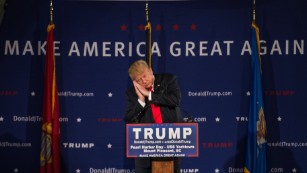


























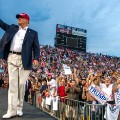
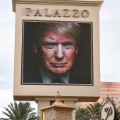
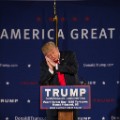


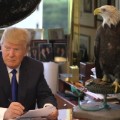
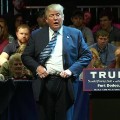
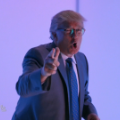

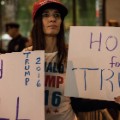
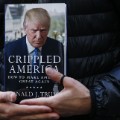
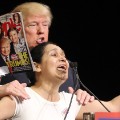
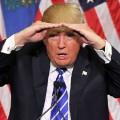
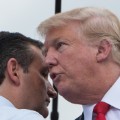
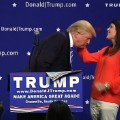
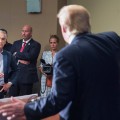

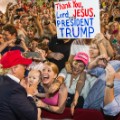

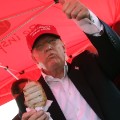
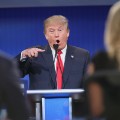
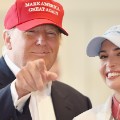
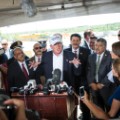
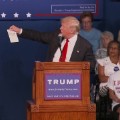
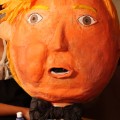
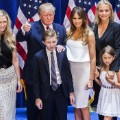
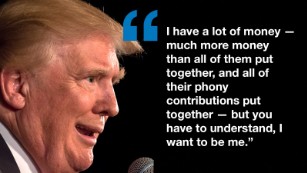






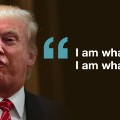
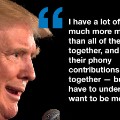
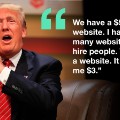
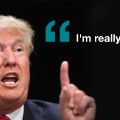
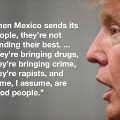
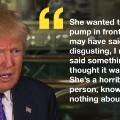
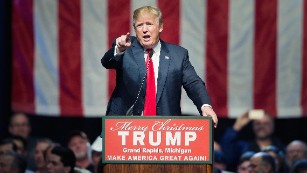
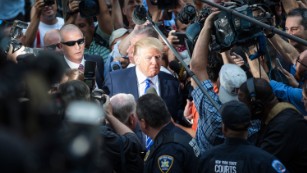
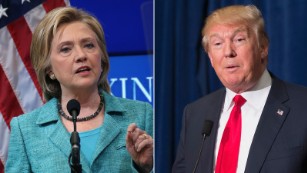
No comments:
Post a Comment